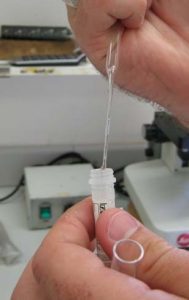Ron Hines DVM PhD


Fecal Alpha-1-Protease (=proteinase) Inhibitor Activity In Your Pet’s Stool = Fca1-Pl
To the best of my knowledge, Texas A&M University Veterinary School, the former provider, no longer offers this test
This test was developed at Texas A&M Veterinary School as an early indicator (warning) of intestinal diseases that allow proteins of the body to leak out of your pet’s system and into its digestive tract (protein-loosing enteropathies).
The Veterinary College at Texas A&M supports a large intestinal disease research laboratory that has developed, patented and re-licensed many of these tests (primarily to Idexx Laboratories).
The test is thought to give early warning of inflammatory situations in your pet’s intestines before changes in your pet’s blood proteins (hypoalbuminemia) are likely to show up on a standard blood chemistry panels and before symptoms like diarrhea or weight loss become pronounced in your pet. So, your veterinarian would be most likely to suggest this test when an extended period of unexplained digestive disturbances occur.
Reasons Why Your Pet’s Fca1-Pl Levels Might Be High:
Inflammatory bowel disease (IBD dog, IBD cat), intestinal lymphoma, certain intestinal wall infections (e.g. histoplasmosis) or intestinal parasites can all increase the concentration of this compound in your pet’s stool. It can be elevated in pets that have swallowed a foreign object as well or when the pet’s intestine has “folded” over on itself (intussusception). Situations where unhealthy bacteria have crowded out the healthy ones or moved upwards in the small intestine (small intestinal bacterial overgrowth = SIBO), intestinal tract infections, autoimmune disease and enlargement of the many lymph channels that line your pet’s intestine (lymphangiectasia) can also elevate Fca1-Pl readings.
The Fca1-Pl assay is less likely to detect intestinal disease in puppies and kittens or immature dogs and cats (less than 1 year old) because they can normally leak substantial amounts of Fca1-Pl.
The first use of the Fca1-Pl test that I know of was in identifying genetic carriers of low blood proteins in Soft Coated Wheaten Terriers.
DxMe
You are on the Vetspace animal health website



